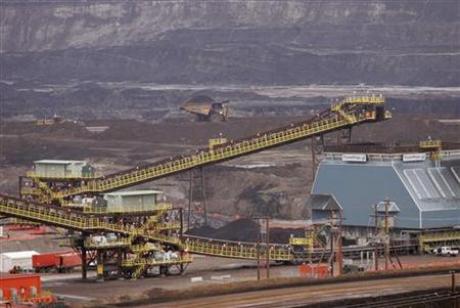Oil Sands Polluting Canadian River System: Study
Country: CANADA
Author: Jeffrey Jones

A truck drives down a street at Syncrude's oil tar sands operation
near Fort McMurray, Alberta in this May 23, 2006 file photo.
Photo: Reuters/Todd Korol/Files
Canada's vast oil sands operations are polluting the Athabasca River system, researchers said on Monday, in a report that is bound to fuel the environmental battle over developing the resource.
Contradicting Alberta government assertions that toxins in the watershed occur naturally, the researchers said mercury, arsenic, lead and cadmium are among 13 toxins released into the Athabasca, which flows north through the oil sands operations.
The findings of the study, coauthored by University of Alberta biological scientists Erin Kelly and David Schindler, should be a signal for the Alberta provincial government to consider limits on oil sands development, Schindler said.
"I really think it's time to cut down the expansion until some of those problems and how to reduce them are solved," he said in an interview.
The U.S. Environmental Protection Agency considers the substances to be priority pollutants, or ones that are toxic in low concentrations.
The environmental impact of developing the oil sands, the biggest reserves of crude outside the Middle East, has been a topic of snowballing controversy around the world. The Alberta government has devoted millions of dollars to defend the multibillion-dollar industry.
The latest research is published in the journal Proceedings of the National Academy of Sciences.
Schindler said the incidence of pollutants in fish is particularly worrisome, as local populations depend on the region's fishery for food.
"I don't think the concentrations alone are dangerous. I worry about some of them, like mercury, because there, parts per trillion translate into parts per million in fish," he said.
The report contradicts material from a government-supported and industry-funded agency, called the Regional Aquatics Monitoring Program, or RAMP, which published material as recently as 2009 that said the Athabasca's water quality is similar to conditions before oil sands development.
But Schindler said the RAMP monitoring and findings "violate every rule" of long-term study. "We deliberately planned the study to test that claim," he said, noting that concentrations of pollutants were higher in samples that were taken closer to the oil sands plants.
RAMP spokesman Fred Kuzmic said Schindler's criticism was based on a 2004 peer review that triggered 64 improvements in its monitoring practices. It is undergoing another peer review scheduled to be completed by the end of the year.
"We had offered Dr. Schindler one of the eight positions to review our program and he had declined to participate in that peer review," Kuzmic said. "We do have eight other academics that were selected by an independent party that RAMP contracted to work at arm's length."
RAMP studies have shown cases with higher concentrations of pollutants closer to oil sands operations, he said.
"But that's not unexpected because the rivers run through the oil sands deposits themselves," Kuzmic said.
He did not go so far as to say the new report is flawed, but said he needed to study it in more detail.
Kim Westcott, senior surface water policy specialist with Alberta's environment ministry, said she could not address many of the study's conclusions without having seen much of the background material they are based on.
"RAMP has many more years of data than this one year of data that Dr. Schindler has, but Dr. Schindler seems to have hit a number of sites so maybe there's some spatial coverage that we didn't have previously," she said. "It will be interesting to compare that."
Schindler said airborne pollutants that are contaminating land and water should be reasonably simple for the oil industry to reduce, based on available technology. But he urged more stringent regulations for water.
The study's other authors are Peter Hodson of Queens University; Jeffrey Short of Oceana, Juneau; and Roseanna Radmanovich and Charlene Nielsen of the University of Alberta.
(Editing by Rob Wilson and Janet Guttsman)